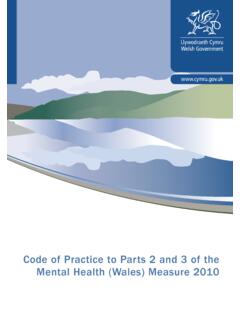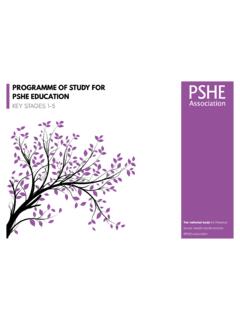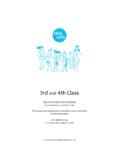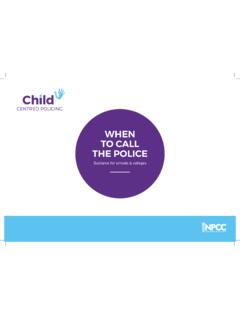Transcription of The Curriculum for Wales Relationships and Sexuality ...
1 The Curriculum for Wales . Relationships and Sexuality education Code WG21-92. The Curriculum for Wales . Relationships and Sexuality education Code Audience Under the Act, this guidance is statutory for the following: the head teacher of a maintained school or a maintained nursery school the governing body of a maintained school or a maintained nursery school a provider of funded non-maintained nursery education the teacher in charge of a pupil referral unit the management committee for a pupil referral unit a person who provides teaching and learning for a child, otherwise than at a maintained school, maintained nursery school or pupil referral unit (EOTAS). a local authority in Wales . Further information Enquiries about this document should be directed to: Curriculum Realisation Unit Curriculum and Assessment Division The education Directorate Welsh Government Cathays Park Cardiff CF10 3NQ.
2 E-mail: @WG_Education Facebook/EducationWales Mae'r ddogfen yma hefyd ar gael yn document is also available in Welsh. Crown copyright 2021 WG44009. 2. Relationships and Sexuality education (RSE) Code This Code contains mandatory requirements, the legal basis for which is set out in the legislation summary of this Curriculum for Wales framework guidance. It sets out the themes and matters that must be encompassed in RSE. A Curriculum and teaching and learning must encompass the mandatory element of RSE outlined within the following RSE Code. Designing your Curriculum This mandatory RSE Code supports schools to design their RSE. The content is set within the context of broad and interlinked learning strands, namely: Relationships and identity sexual health and well-being empowerment, safety and respect. These strands allow practitioners to design and develop a Curriculum tailored to their learners, making connections and developing authentic contexts for learning across the Curriculum .
3 The Welsh Government committed to covering the following themes in RSE: Relationships ; rights and equity; sex, gender and Sexuality ; bodies and body image;. sexual health and well-being; and violence, safety and support. To assist schools and settings in their planning of RSE, these themes are interwoven into the learning strands. Across the learning strands, Curriculum content in RSE must be inclusive and reflect diversity. It must include learning that develops learners' awareness and understanding of different identities, views and values and a diversity of Relationships , gender and Sexuality , including LGBTQ+ lives. Learning about rights and equity runs through all the strands, as well as embedding learning and experience through a rights-based approach to the learning. Content appropriate to learner development The Act requires that the RSE schools provide must be developmentally appropriate for learners.
4 This means schools and settings must take account of a range of factors including the learner's age; knowledge and maturity; any additional learning needs and anticipating their physiological and emotional development. RSE must be developmentally appropriate for each learner, meaning that learners' needs of similar ages may differ. The phases have been designed to give practitioners an understanding of what is likely to be developmentally appropriate. For example, in phase 1 and 2, learners will be taught about the principles of general consent as pre-requisites for learning about sexual consent at the developmentally appropriate time in phase 3. In practice, this means learners in phases one and two developing an awareness of asking for permission to share materials, for example toys; or learning about respecting personal boundaries. 3. The phases are designed to help schools and settings make judgements about whether learning is developmentally appropriate for specific learners.
5 The ages set out below indicate broadly when practitioners should start to consider whether learning in a phase is developmentally appropriate for their learners. This may mean some learners will be ready for specific learning before the broad indications given in the Code, but likewise it may mean that some learners need opportunity for further development before they engage with specific learning. Introduction to a phase may be gradual: with some learning in that phase being developmentally appropriate for learners sooner than other learning. As outlined above, these decisions must be based on a range of factors. The tables attached to each strand of learning below are in three broad developmental phases. As they are set out, they represent the building blocks of progression in RSE. As learners progress, they will be building upon previous learning from either phase one; or phases one and two, consolidating and strengthening the same dispositions, knowledge and skills and applying them in new, relevant contexts.
6 This is very different to simply acquiring learning about topics in isolation and then moving on to other content. The learning for RSE refers to both what is taught expressly and what is embedded throughout the Curriculum and in the school environment through the whole school approach. 4. Relationships and identity This strand focuses on: the range of Relationships that human beings have throughout their lives how identity can be shaped by our Relationships and Sexuality the importance of human rights in securing healthy, safe and fulfilling Relationships in an inclusive society. Learners need to develop the understanding and behaviours that will support them to develop and maintain healthy, safe and fulfilling Relationships throughout their lives. Learners need to be supported to recognise and value different types of Relationships , including families and friendships, as well as the diversity within different types of Relationships , including LGBTQ+ diversity, and that these can change over time.
7 Developing empathy, compassion and communication skills are critical to learners'. Relationships now and the Relationships they will form in the future. This will also support respect, understanding and equitable treatment for others, whatever their sex, gender, Sexuality , faith or belief. Learners also need to develop both their sense of self and their sense of everyone being unique. Over time, learners can explore how Relationships , sex, gender, romantic and sexual attraction and personal experiences may shape and inform a person's identity and individuality. This supports learners to understand how identity, Relationships and Sexuality are informed by biology, technology and social, cultural and religious norms and that these may change over time. By engaging with these aspects, learners can recognise both positive and harmful behaviours and norms and have the confidence to speak up for themselves and to speak out and advocate for the rights and respect of others.
8 This strand also recognises how rights can support and underpin equitable, respectful Relationships , as well as a fair and inclusive society. Phase 1 Phase 2 Phase 3. Practitioners should consider learners' developmental appropriateness for learning in each phase: From age 3 From age 7 From age 11. The learning supports: Understanding the positive Ability to act with and negative kindness, empathy and characteristics and healthy compassion in Ability to form and or unhealthy aspects of a interactions with others maintain Relationships range of Relationships immediate to them which are equitable, including family, friendship, including family, respectful and kind with romantic and sexual. friendship and peer a range of others. Relationships . Ability to develop and understand the importance of equity, mutual respect, 5. and affection in Relationships with others. Understanding and use of How understanding and effective communication, use of effective decision making, managing communication, An awareness of how to and resolving conflict, and decision-making, communicate wants and refusal skills in a range of managing conflict and needs in Relationships , different contexts and types refusal skills are part of and begin to respect of Relationships , offline and ensuring your own and those of others.
9 Online, including intimate others rights and part of Relationships . friendships and Awareness of how needs Relationships . relate to rights. Understanding how to speak out about harmful behaviours directed at them or others. Awareness of the Recognition of the Understanding how the diversity of families and characteristics of diversity of Relationships Relationships , including different families, including marriage, and all friendship and peer friendship and peer types of civil partnership, Relationships , and why Relationships and the has changed over time, these are important. diversity of these. and how Relationships are positively and negatively Understanding positive impacted by social and behaviours in cultural norms and laws in Relationships and what different ways around the can happen when world. Relationships breakdown. An awareness of how families, Relationships and parenting are shaped by social and cultural norms and laws that have changed over time.
10 Developing a sense of Recognising how Understanding how rights themselves, in the context people's Relationships need to be balanced in a of families, friends and with others shape who diverse society; the communities. they are and their characteristics, benefits happiness. and challenges of living in Recognising how people a diverse society; and how value different things and An awareness of how and why attitudes have have different families, identity can be changed and are changing friends and communities. 6. expressed in different including towards gender ways. and Sexuality diversity. Experiencing inclusive Valuing and recognising An ability to advocate for behaviours, language and the contributions of and advance the rights of role modelling that show everyone; and the all and understand and respect for others, importance of sex and respect all people in whatever their gender.














